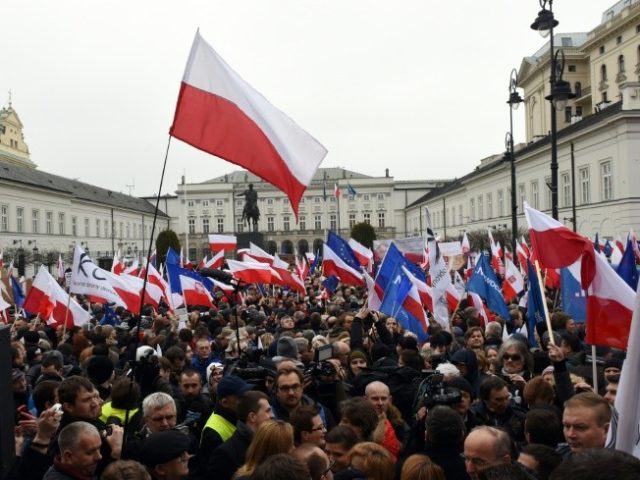This morning’s key headlines from GenerationalDynamics.com
- Tens of thousands in pro-EU anti-government protest in Warsaw Poland
- Thousands of Berlin protesters chant ‘No Islam on German soil’
- Hooded anarchists in Italy turn violent on Austrian border
Tens of thousands in pro-EU anti-government protest in Warsaw Poland

Tens of thousands in anti-government, pro-EU protests in Warsaw, Poland
45,000 or more protesters gathered in Warsaw, Poland, on Saturday for pro-European Union anti-government demonstrations.
The ruling Law and Justice party came to power in a landslide October election win, and have severely restricted human rights with reforms to the constitutional tribunal, public media, civil service and surveillance laws. These reforms have been criticized by European Union officials as contrary to EU principles of democracy.
Saturday’s protests were the biggest in Poland since 1989 and the fall of Communism. In recent years, there have been an increasing number of mass protests in cities across Poland, often with contradictory objectives, as if people wanted to protest just for the sake of protesting. The protests are on both sides of the political spectrum. There have been similar situations in Hungary, Romania, and the Czech Republic.
In Hungary, the divisions are so deep that, according to one observer, the two social camps read different newspapers and use completely different arguments that are oblivious to the perspective of the opposing side. These divides often cut across families, friendships and professional circles. Radio Poland and Visegrad Insight
Thousands of Berlin protesters chant ‘No Islam on German soil’
Over 1,000 far-right extremists chanted “Merkel must go” and “No Islam on German soil,” and protested the immigration policies of Chancellor Angela Merkel. However, the anti-Merkel protests drew only a small fraction of the numbers that the organizers had predicted. A similar rally in March drew 3,000.
Also, there was a sizeable counter-demonstration of around 4,500 people in support of Merkel. The confrontation between the two sides was mostly peaceful, with only small outbreaks of violence.
A third rally of about 3,000 people, organized by regional Protestant churches, was billed as a “stroll for worldly openness and tolerance” from the Brandenburg Gate to the city’s central Gendarmenmarkt square. Express (London) and Deutsche Welle
Hooded anarchists in Italy turn violent on Austrian border
Hundreds of hooded “anarchist” protesters assembled in Italy on the border with Austria on Saturday and clashed violently with police during a demonstration against the Austrian government’s plans to erect a fence at the Brenner Crossing between Italy and Austria, which would block asylum seekers from crossing from Italy into Austria.
It is estimated that about 30,000 migrants have reached Italy so far this year, mostly crossing the Mediterranean Sea from Libya by boat, and Austrian authorities have expressed the fear that masses of migrants would try to enter Austria.
Austria’s Interior Minister Wolfgang Sobotka has said he believed that that as many as a million migrants were poised to cross the Mediterranean from Libya this year. Italy says the figure is likely to be much lower.
The protest at Brenner Pass turned violent on Saturday, with Italian police firing teargas at hundreds of protesters throwing stones and firecrackers. It was the third violent demonstration to take place at the Brenner Pass in just over a month.
Both German Chancellor Angela Merkel and Italian Prime Minister Matteo Renzi warned that unless the European Union found a common migration stance, old nationalist ghosts would reawaken. According to Merkel:
“Either we defend our external borders and we do it together or we risk falling back into nationalism. This is not a challenge for Greece, Germany or Italy, but these are challenges that have to do with the future of Europe.”
Jean-Claude Juncker, European Commission president, said on Saturday that Austria imposing controls on its border with Italy would be a “political catastrophe” for Europe. Vice News and Washington Post and Reuters and The Local (Austria)
KEYS: Generational Dynamics, Poland, Warsaw, Law and Justice party, Hungary, Romania, Czech Republic, Germany, Angela Merkel, Italy, Austria, Brenner Pass, Wolfgang Sobotka, Matteo Renzi, Jean-Claude Juncker
Permanent web link to this article
Receive daily World View columns by e-mail

COMMENTS
Please let us know if you're having issues with commenting.